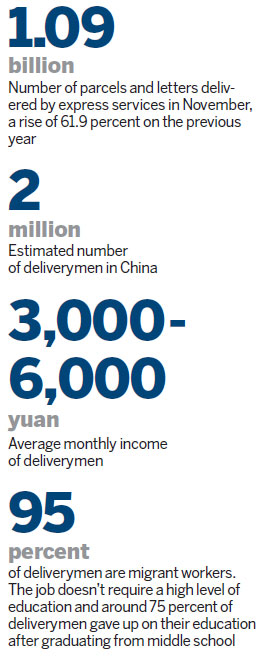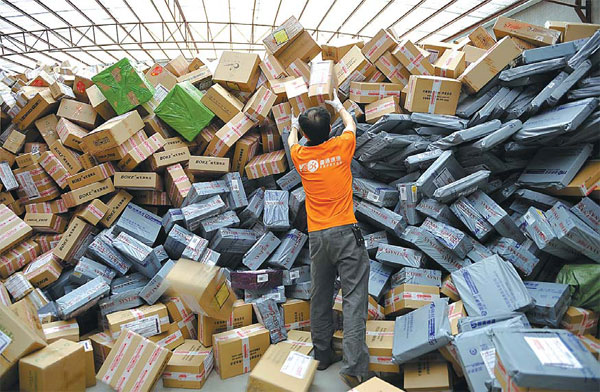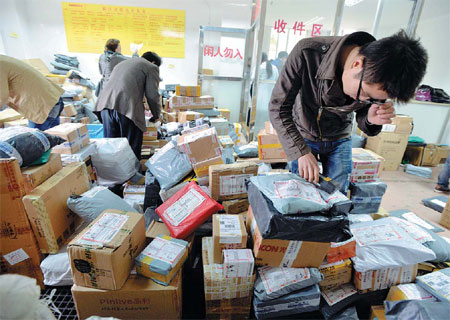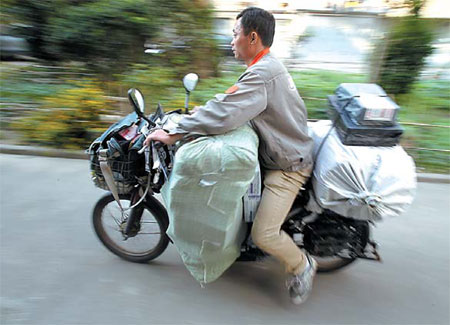Stand and deliver
Updated: 2014-01-01 07:12
By Yang Yang (China Daily)
|
||||||||
The logistics industry is booming, but it's a tough life for those on the roads, as Yang Yang reports from Beijing.
On Nov 29, Liu Xingliang of Guangrao county in East China's Shandong province died after receiving an express parcel at home in the morning delivered by YTO, one of China's largest express and logistics companies. The parcel contained a pair of shoes Liu had bought for his daughter but the goods had been contaminated by a poisonous chemical that had leaked from a plastic bottle during transportation.
The leak contaminated 154 parcels and letters causing two customers and seven deliverymen to fall ill and be sent to the hospital.
A chemical factory in Hubei province had sent the parcel, claiming that the fluid was harmless, and the deliveryman who picked up the parcel did not bother to check. Even when delivery staff in Shandong fell sick after coming into contact with the contaminated mail, they did not examine the sticky, pungent smelling liquid.
It wasn't the first time the chemical company had sent the dangerous fluid through the post, but previously it had only sent 1 kilogram at a time. The lethal package that resulted in Liu's death contained 25 kg.
Although China's express delivery market has boomed in the past few years, especially since the now massive Nov 11 online shopping carnival started in 2012, the industry is still labor intensive, meaning parent companies grant franchises to small, local companies, which has led to many management problems.
On Nov 11, the daily turnover of the online shopping platform Taobao reached more than 35 billion yuan ($5.7 billion), rising from 19 billion in 2012. In November, express delivery services delivered 1.09 billion parcels and letters, a rise of 61.9 percent from 2012 as total revenue grew by 43.7 percent to 16 billion yuan, according to the statistics by the State Post Bureau.
The statistics also show that in the previous 11 months, the total volume was 8.12 billion, a year-on-year increase of 61.4 percent. Revenue hit 128.6 billion yuan, a rise of 36.4 percent compared with 2012.
Roland Berger Strategy Consultants estimates that by 2018 the value of the domestic express delivery market will be 245.6 billion yuan and the value of business-to-customer services will grow at an annual rate of 37 percent.
"China's e-commerce industry, especially B2C, has grown rapidly, and it's amazing to see the development of delivery companies to catch up with the growth," said Wang Xin, a consultant at Roland Berger.
However, the expansion mode of Chinese express delivery companies has resulted in a number of problems.
Unlike companies such as FedEx and UPS, which hold a combined market share of 80 percent in the US, most of China's leading express delivery companies are expanding via smaller franchises, according to Wang.
"The core problem is how to manage those franchises," she said.
The local company tasked with delivering the chemical that killed Liu is a YTO franchise.
The relatively low salaries paid to delivery staff, given the long hours and working conditions, has also contributed to the problems facing the industry.
Guo Bin, a 37-year-old deliveryman for STO, one of China's largest express delivery companies in Beijing, said that although deliveryman should get 1 yuan for each parcel or letter they deliver, the actual amount is less than 0.5 yuan.
"Our manager sometimes deducts money and claims that head office has demanded it, but we have no idea whether that's true or not," he said.
In one period, Guo delivered 6,000 items, but still only made 1,000 yuan. "Sometimes customers will call to check the status of the mail. Delivery staff lose 100 yuan for each call, no matter what the reason for the delay is," he said.

"We make most of our income from picking up mail," he said. If the charge for a parcel is 12 yuan, the deliveryman will earn two yuan. If the parcel is heavy and the charge is 50 yuan, the most they can make is 20 yuan.
The average monthly income for deliverymen is between 3,000 and 6,000 yuan, said Xu Yong, chief consultant at China Express & Logistics Consulting. In big cities such as Beijing and Shanghai incomes may be higher - during peak times some deliverymen can make 10,000 yuan in a month - but that doesn't happen very often.
As a result, in order to earn more money, some deliverymen break the rules and will deliver dangerous goods. The higher fee they charge for the delivery goes straight into their pockets.
Guo Bin and his colleagues usually work more than 12 hours a day, or even longer during busy periods. They earn around 7,000 yuan a month, but few express delivery companies provide endowment insurance, medical or unemployment insurance.
"We only have accident insurance," Guo said.
Huge workloads
The periods directly before and after the Nov 11 online shopping carnival are peak times and many deliverymen quit because of the huge workload, the Beijing Evening News reported. One report claimed that a deliveryman from Jingdong online shopping mall died suddenly because of the high workload. The company denied the claim.
"Express delivery companies need delivery workers, so to attract more people into the industry, they offer salaries as high as 8,000 yuan a month. However, people born in the 1980s and 90s expect more than just money. They want a clear and good career path," Xu Yong said.
There are about 2 million deliverymen in China, according to Jack Ma, founder of Alibaba, China's largest e-commerce company.
Delivering parcels and letters doesn't require a high level of education or professional skills. Around 75 percent of deliverymen gave up on education after graduating from middle school and 95 percent of them are migrant workers, said Xu.
According to Wang, although the "fatal express" is a very serious problem for Chinese companies, that doesn't mean that express delivery services are getting worse.
"As a matter of fact, if you check the service index of express delivery companies provided by Taobao, you will see it keeps improving," she said.
Not only can online shoppers on Taobao see the service index, they can also rate the services shown in it
"To manage their franchises, express delivery companies such as STO and YTO can use information technology to standardize the business process. They have to set up effective mechanism to award or punish franchises or deliverymen if they do not follow the rules," said Wang.
Many companies have now imposed strict rules. "We must stamp the tickets when we pick up a parcel, or we will be fined 100 yuan. We are also supposed to examine the contents, even if they are packed beforehand. It's illegal to deliver dangerous goods by express," said Guo, recalling the case of an STO deliveryman in Beijing who was fined 10,000 yuan because the company found a knife in a parcel.
"We have to be very cautious about carrying prohibited goods, especially because the smallest fine is 5,000 yuan if we are found to be carrying illegal goods," said Ma Qinghui, an STO deliveryman.
Contact the writer at yangyangs@chinadaily.com.cn
|
A member of staff selects parcels at the Guangzhou offices of YTO, one of China's largest express and logistics companies. Liang Xu / Xinhua |
|
Deliveryman Xiao An scans parcels. It's his first job after graduating from college in the summer. Provided to China Daily |
|
A deliveryman on the road. There are about 2 million of them in China. Liang xu / Xinhua |
(China Daily 01/01/2014 page1)

 US First Family out for shave ice in Hawaii
US First Family out for shave ice in Hawaii
 New Year's Eve celebrations in Times Square
New Year's Eve celebrations in Times Square
 Revellers embrace the New Year at Great Wall
Revellers embrace the New Year at Great Wall
 Israel frees 26 Palestinian prisoners
Israel frees 26 Palestinian prisoners
 Gen Y's motto: Show me the money
Gen Y's motto: Show me the money
 Sacred mountain of wonders
Sacred mountain of wonders
 Schumacher 'slightly better' after 2nd operation
Schumacher 'slightly better' after 2nd operation
 IOC boss expects 'safe' Sochi Games
IOC boss expects 'safe' Sochi Games
Most Viewed
Editor's Picks

|

|

|

|

|

|
Today's Top News
DPRK leader calls for better ties with ROK
China ready to further advance ties with US
China to promote cultural soft power
US consumer mood brightens
China suspends Pfizer imports
Cities offer 72-hour visa-free stays
Utah to suspend gay marriage
Ringing in the New Year Chinese style
US Weekly

|

|











